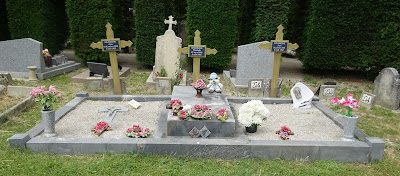English biochemist Jack Drummond, his wife Anne and ten-year-old daughter Elizabeth were murdered when the family were travelling in France in a Hillman Minx brake. Drummond parked by the side of the road near Lurs (04) on 5 August 1952, the family camped, and the three were murdered. What has been called the Dominici affair because of Gaston Dominici's conviction is widely open to dispute, and the real facts behind the crime will most likely never be solved. The presence of Jean Giono hovers aroud here as in most parts of Provence, he attended the court case, and wrote a short book on his findings.
Showing posts with label Forcalquier (04). Show all posts
Showing posts with label Forcalquier (04). Show all posts
12 June 2019
4 November 2018
Pierre Magnan: La Folie Forcalquier (1995)
Libellés :
Alpes-de-Haute-Provence (04),
Forcalquier (04),
Magnan (Pierre),
Provence
This takes place at the end of the era of Napoleon III, and is set in and around Forcalquier in Alpes-de-Haute-Provence, with the narrator and protagonist Félicien Brédennes, a herbalist and something of a quack doctor, something of a petty thief, and a great deal of a lover of numerous women.
And the vocabulary is quite a mountain to climb, with not only archaic expressions but – this being an epic full of the atmosphere and smells of Provence – also the names of many herbs, flowers, etc.
It is also the story of devastating letters, fear, murder, and general mayhem. There are many characters described here, perhaps the most colourful, apart from Brédennes, being the rich highwayman Zinzolin and the sex-loving Aigremoine, with who Brédennes and Zinzolin (her unwitting father) separately share sex romps.
There's a fair amount of blood shed, a great deal of chasing (especially by Brédennes on his horse behind the stolen coffin-shaped buggy), and changing affinities: a long, convoluted story with almost as many twists and turns as the horses themsleves have to undergo.
That, perhaps, is the main problem: at 487 pages, the novel goes on far too long for its own worth: which is a pity, as Pierre Magnan can write a hell of a tale with tremendous jest and confidence.
And the vocabulary is quite a mountain to climb, with not only archaic expressions but – this being an epic full of the atmosphere and smells of Provence – also the names of many herbs, flowers, etc.
It is also the story of devastating letters, fear, murder, and general mayhem. There are many characters described here, perhaps the most colourful, apart from Brédennes, being the rich highwayman Zinzolin and the sex-loving Aigremoine, with who Brédennes and Zinzolin (her unwitting father) separately share sex romps.
There's a fair amount of blood shed, a great deal of chasing (especially by Brédennes on his horse behind the stolen coffin-shaped buggy), and changing affinities: a long, convoluted story with almost as many twists and turns as the horses themsleves have to undergo.
That, perhaps, is the main problem: at 487 pages, the novel goes on far too long for its own worth: which is a pity, as Pierre Magnan can write a hell of a tale with tremendous jest and confidence.
Subscribe to:
Posts (Atom)







